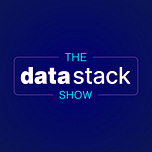This week on The Data Stack Show, Eric and John welcome Patrik Devlin, Co-Founder and CTO at Wilde AI. During the conversation, Patrik talks about his background in software and data engineering, his startup experiences, and the technical intricacies of Wilde's predictive lifetime value (LTV) product. Key topics include the use of DuckDB and Mother Duck in data architecture, the realities versus marketing of data clean rooms, and the evolution and technical challenges of QR codes. Patrik also discusses Wilde's data-sharing strategies, the importance of developer experience, future directions in data processing technologies, and more.
Highlights from this week’s conversation include:
Patrik's Background and Journey to Wilde (1:12)
The Evolution of QR Codes (4:09)
Marketing Analytics and Clean Rooms (9:52)
Challenges in Data Sharing (13:20)
Technical Challenges with Clean Rooms (15:37)
Exploring Current Data Infrastructure (19:11)
Data Orchestration Tools (22:50)
Performance Tuning and Data Syncing (24:00)
Choosing Data Tools (26:08)
Mother Duck and Data Warehousing (00:30:31)
Flexible Data Architecture (32:40)
DuckDB Implementation (35:36)
Data Marketplace Concept (38:34)
Asset Availability in Data Queries (42:21)
Transition from Software Engineering to Data Stack (46:36)
Data Contracts and Type Safety (49:10)
Database Schema Perspectives (50:27)
Final Thoughts and Takeaways (51:35)
The Data Stack Show is a weekly podcast powered by RudderStack, the CDP for developers. Each week we’ll talk to data engineers, analysts, and data scientists about their experience around building and maintaining data infrastructure, delivering data and data products, and driving better outcomes across their businesses with data.
RudderStack helps businesses make the most out of their customer data while ensuring data privacy and security. To learn more about RudderStack visit rudderstack.com.





